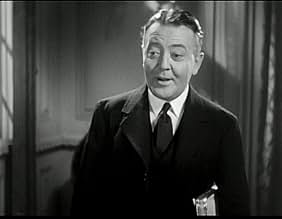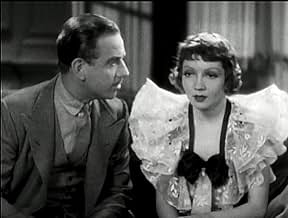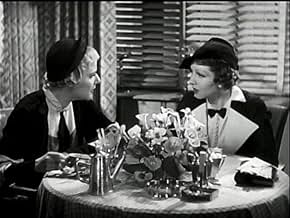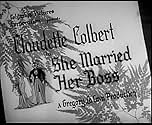Agrega una trama en tu idiomaAn efficient secretary at a department store marries her boss, but discovers that taking care of him at home is a lot different to taking care of him at work.An efficient secretary at a department store marries her boss, but discovers that taking care of him at home is a lot different to taking care of him at work.An efficient secretary at a department store marries her boss, but discovers that taking care of him at home is a lot different to taking care of him at work.
- Dirección
- Guionistas
- Elenco
- Premios
- 1 premio ganado en total
Grace Hayle
- Agnes Mayo
- (as Grace Hale)
Ernie Adams
- Passerby
- (sin créditos)
William Arnold
- Department Head
- (sin créditos)
Lynton Brent
- Assistant Window Dresser
- (sin créditos)
Edmund Burns
- Newspaper Photographer
- (sin créditos)
A.S. 'Pop' Byron
- Store Watchman
- (sin créditos)
- Dirección
- Guionistas
- Todo el elenco y el equipo
- Producción, taquilla y más en IMDbPro
Opiniones destacadas
Going against the Grain.
Really liked it.
It has certain Hayes code 'return to domesticity' storyline that stops it below masterpiece level BUT it has similar vibes of La Cava's best romcom, My Man Godfrey. It just feels effervescent. The dry wit with an unhinge commentary on Classicism of the rich, is so fun to watch.
Again going against the grain, loved performances from Colbert and Douglas. Jean Dixon steals the spotlight ,as Julia's freewheeling friend and confidant, everytime too.
A minor criticism though is that Winslow's script should have developed the minor characters more. I think lot of the negative criticism stems with how off putting they came off - especially Alexander's Getrude Barclay.
Recommended.
Really liked it.
It has certain Hayes code 'return to domesticity' storyline that stops it below masterpiece level BUT it has similar vibes of La Cava's best romcom, My Man Godfrey. It just feels effervescent. The dry wit with an unhinge commentary on Classicism of the rich, is so fun to watch.
Again going against the grain, loved performances from Colbert and Douglas. Jean Dixon steals the spotlight ,as Julia's freewheeling friend and confidant, everytime too.
A minor criticism though is that Winslow's script should have developed the minor characters more. I think lot of the negative criticism stems with how off putting they came off - especially Alexander's Getrude Barclay.
Recommended.
I've read the other comments that talked about aspects of this film that are dated, offensive, or just plain bizarre. I was rather surprised that no one brought up the movie's cringe-inducing gender stereotypes. Anyone who has seen Claudette Colbert or Melvyn Douglas in the films they made before the introduction of the Production Code(in mid-1934) would immediately recognize the heavy hand of the censors, who did their best to impose on Hollywood their narrow-minded idea of "family values." (On the basis of this film, it would appear that allowing married women to pursue a career would bring about the end of American society, but child abuse and drunk driving are just good clean fun!) Though the cast and plot look good on paper, the result is strained and uneven, as if the script had been written to Pre-Code standards and then hastily cleaned up so as not to offend the censors.
Claudette Colbert plays Julia Scott, a bright, capable, and confident executive assistant at a large department store. She runs the busy office like a well-oiled machine and clearly enjoys the work. It's hard to fathom why she's spent six years mooning over her boss, Richard Barclay. The way the role of Barclay is written, the usually charming Melvyn Douglas comes off as a humorless, sexless cipher. All the more jarring, then, to hear Julia talk about her desire to give up her terrific job and marry Barclay. Without a trace of irony, she describes marriage as "a woman's REAL career."
Okay, she wants to get married. But why on earth would the lovely and vivacious Julia want Barclay as a husband? Not only is he dull as ditch-water, he treats her as if she were a piece of super-efficient office equipment. Once they're married, he ridicules her for assuming the stereotypical role of housewife, despite the fact that she's set his chaotic home in order and tamed his obnoxious brat of a daughter. There's nothing in the movie to explain Barclay's eventual change of heart; apparently it's brought on by a quart of whiskey. So much for good old "family values." The film is so devoid of any hint of sexual attraction that we don't see a single cuddle or smooch--not even at the very end when it's clear that the newlyweds will finally get around to doing what newlyweds are famous for doing. Julia has more physical contact (and chemistry) with Leonard Rogers, her sweet-tempered playboy suitor, who's a lot more appealing as husband material than that cold fish Barclay.
Solid performances are turned in by familiar actors in some of the secondary roles: Raymond Walburn as the perfect butler; Katherine Alexander as Barclay's drama-queen sister; Edith Fellows as the evil daughter; and especially Jean Dixon as Julia's wise-cracking, matchmaking best friend.
Would love to have seen this film made just a year earlier, before the Hays Office started taking their moralizing hatchet to so many of the things that made movies of the 30s worth watching.
Claudette Colbert plays Julia Scott, a bright, capable, and confident executive assistant at a large department store. She runs the busy office like a well-oiled machine and clearly enjoys the work. It's hard to fathom why she's spent six years mooning over her boss, Richard Barclay. The way the role of Barclay is written, the usually charming Melvyn Douglas comes off as a humorless, sexless cipher. All the more jarring, then, to hear Julia talk about her desire to give up her terrific job and marry Barclay. Without a trace of irony, she describes marriage as "a woman's REAL career."
Okay, she wants to get married. But why on earth would the lovely and vivacious Julia want Barclay as a husband? Not only is he dull as ditch-water, he treats her as if she were a piece of super-efficient office equipment. Once they're married, he ridicules her for assuming the stereotypical role of housewife, despite the fact that she's set his chaotic home in order and tamed his obnoxious brat of a daughter. There's nothing in the movie to explain Barclay's eventual change of heart; apparently it's brought on by a quart of whiskey. So much for good old "family values." The film is so devoid of any hint of sexual attraction that we don't see a single cuddle or smooch--not even at the very end when it's clear that the newlyweds will finally get around to doing what newlyweds are famous for doing. Julia has more physical contact (and chemistry) with Leonard Rogers, her sweet-tempered playboy suitor, who's a lot more appealing as husband material than that cold fish Barclay.
Solid performances are turned in by familiar actors in some of the secondary roles: Raymond Walburn as the perfect butler; Katherine Alexander as Barclay's drama-queen sister; Edith Fellows as the evil daughter; and especially Jean Dixon as Julia's wise-cracking, matchmaking best friend.
Would love to have seen this film made just a year earlier, before the Hays Office started taking their moralizing hatchet to so many of the things that made movies of the 30s worth watching.
I used to deal in old-movie memorabilia. In the 1960s, while running a stall in the Portobello Road, I acquired and resold a full-colour poster for 'She Married Her Boss'. What a bizarre piece of artwork! The poster depicted Claudette Colbert with blue eyes, blue hair, and blue skin: she looked a proper Smurfette, or perhaps an Oompa-Loompa. Worse luck, the blue Colbert was placed against a background in the same shade of blue, making her seem to vanish altogether ... except for her lips, which were bright red. For decades, I wanted to view this movie to find out if it was as weird as the poster art.
It turns out to be even weirder. Who designed the costumes here? In the opening scene, Colbert wears a dress with some nice gauntlet cuffs, but it also has a titchy little bow-tie and a pair of lapels the size and shape of an aircraft carrier. In a later scene, Jean Dixon wears an outfit with what appears to be a springboard jutting out of her left shoulder. In the final sequence, Colbert sports raccoon shoulder pads that are so enormous she looks like a linebacker.
This is a screwball comedy, but it's screwier than it needs to be. Michael Bartlett plays a lounge lizard who charms Colbert by telling her she ought to have a mole on her chin. (Ugh!) You know those horribly phony camera set-ups in which an actor sits at a piano keyboard, pumping his elbows, and we're expected to believe he's playing? Bartlett does that here, in one of the fakest versions I've ever seen.
On the positive side, there's a stand-out performance by 12-year-old Edith Fellows as a spoilt brat. Fellows was an immensely talented child actress who had the misfortune to be much less pretty than Shirley Temple, so she got lumbered with Virginia Weidler roles. Colbert hauls Fellows offscreen and gives her a spanking, which would have been funnier if shown on screen. I was delighted by the performance of Raymond Walburn as Melvyn Douglas's butler: amiable, loyal and eventually drunken. Walburn usually played blustering shysters or roguish criminals, so it's a pleasure to see him given this change of pace. Grace Hayle, a character actress whose heavy physique usually cast her in buffoonish roles, is personable here in a nice bit role as Colbert's assistant.
Although the plot is unbelievable (even by screwball comedy standards), individual set pieces are delightful and funny. Colbert and Bartlett host a cocktail party in the shop window of Douglas's department store, with shop dummies as the guests.
The climax of the movie is meant to be funny and romantic, but I found it saddening and maddening. Douglas pretends to abduct Colbert at gunpoint: we know he's faking, but she doesn't and she's evidently terrified. Douglas and Walburn, both drunk to the eyebrows, take Colbert speeding through the city in Douglas's motorcar, the stonkered Walburn at the wheel whilst an undercranked camera shows the car speeding wildly through the streets. I can laugh at comedy based on drunkenness, but it stops being funny when the drunks grab a steering wheel: there have been so many drink-driving tragedies, I just can't laugh at the notion of an inebriate operating a car.
Talking of booze: this movie was directed by Gregory La Cava, a hugely talented and under-rated director who ruined his career through alcoholism. Maybe I'm reading too much into this, but quite a few of La Cava's films -- including this one -- depict characters who solve their problems by getting drunk. I'll rate 'She Married Her Boss' 7 out of 10, but I wish someone could explain this movie's weird Smurfette poster and those ridiculous costumes.
It turns out to be even weirder. Who designed the costumes here? In the opening scene, Colbert wears a dress with some nice gauntlet cuffs, but it also has a titchy little bow-tie and a pair of lapels the size and shape of an aircraft carrier. In a later scene, Jean Dixon wears an outfit with what appears to be a springboard jutting out of her left shoulder. In the final sequence, Colbert sports raccoon shoulder pads that are so enormous she looks like a linebacker.
This is a screwball comedy, but it's screwier than it needs to be. Michael Bartlett plays a lounge lizard who charms Colbert by telling her she ought to have a mole on her chin. (Ugh!) You know those horribly phony camera set-ups in which an actor sits at a piano keyboard, pumping his elbows, and we're expected to believe he's playing? Bartlett does that here, in one of the fakest versions I've ever seen.
On the positive side, there's a stand-out performance by 12-year-old Edith Fellows as a spoilt brat. Fellows was an immensely talented child actress who had the misfortune to be much less pretty than Shirley Temple, so she got lumbered with Virginia Weidler roles. Colbert hauls Fellows offscreen and gives her a spanking, which would have been funnier if shown on screen. I was delighted by the performance of Raymond Walburn as Melvyn Douglas's butler: amiable, loyal and eventually drunken. Walburn usually played blustering shysters or roguish criminals, so it's a pleasure to see him given this change of pace. Grace Hayle, a character actress whose heavy physique usually cast her in buffoonish roles, is personable here in a nice bit role as Colbert's assistant.
Although the plot is unbelievable (even by screwball comedy standards), individual set pieces are delightful and funny. Colbert and Bartlett host a cocktail party in the shop window of Douglas's department store, with shop dummies as the guests.
The climax of the movie is meant to be funny and romantic, but I found it saddening and maddening. Douglas pretends to abduct Colbert at gunpoint: we know he's faking, but she doesn't and she's evidently terrified. Douglas and Walburn, both drunk to the eyebrows, take Colbert speeding through the city in Douglas's motorcar, the stonkered Walburn at the wheel whilst an undercranked camera shows the car speeding wildly through the streets. I can laugh at comedy based on drunkenness, but it stops being funny when the drunks grab a steering wheel: there have been so many drink-driving tragedies, I just can't laugh at the notion of an inebriate operating a car.
Talking of booze: this movie was directed by Gregory La Cava, a hugely talented and under-rated director who ruined his career through alcoholism. Maybe I'm reading too much into this, but quite a few of La Cava's films -- including this one -- depict characters who solve their problems by getting drunk. I'll rate 'She Married Her Boss' 7 out of 10, but I wish someone could explain this movie's weird Smurfette poster and those ridiculous costumes.
Terribly uneven mix of comedy and romantic drama, the script of SHE MARRIED HER BOSS is unworthy of the talents assembled to interpret it. The always reliable Claudette Colbert has to contend with lines like: "Marriage is a woman's real career," as a woman secretly in love with her boss for six years. MELVYN DOUGLAS is the boss, but his part his so poorly written that you have to wonder what Colbert ever sees in him. Nevertheless, he plays it with a flair for this sort of inane comedy.
JEAN DIXON as Colbert's friend and KATHERINE Alexander as Douglas' snooty sister are just cardboard cutouts. And poor EDITH FELLOWS has to play the most insufferable brat since Bonita Granville's turn in THE CHILDREN'S HOUR.
There are various lapses of taste throughout (from today's viewpoint), and the costumes are really the most unflattering female designs ever worn by Colbert in any of her early films. You have to yearn for the Colbert of the '40s (so smartly sophisticated) because she looks downright dowdy in most of her odd wardrobe choices. As I say above, dated in more ways than one.
Not recommended.
JEAN DIXON as Colbert's friend and KATHERINE Alexander as Douglas' snooty sister are just cardboard cutouts. And poor EDITH FELLOWS has to play the most insufferable brat since Bonita Granville's turn in THE CHILDREN'S HOUR.
There are various lapses of taste throughout (from today's viewpoint), and the costumes are really the most unflattering female designs ever worn by Colbert in any of her early films. You have to yearn for the Colbert of the '40s (so smartly sophisticated) because she looks downright dowdy in most of her odd wardrobe choices. As I say above, dated in more ways than one.
Not recommended.
Most modern viewers of 1930's comedies will be accustomed to the necessity of suspending disbelief and modern sensibilities to entirely enjoy these films. However, She Married Her Boss contains one or two scenes which make this a difficult task. The main problematic scene is the drunk driving scene which is sufficiently reckless as to be just plain alarming to modern audiences but fortunately occurs at the end of the movie so as not to be troubling throughout. The second such scene however is the (aural) scene of Julia (Claudette Colbert) spanking Anabelle several times with a hairbrush. In modern times, with the idea of physically punishing children being so controversial, this scene refuses to simply fade into the background of the film and become simply a comedic scene and lingers in a slight feeling of unease in watching the remainder of the film despite Annabelle's growing affection for Julia. Simliarly Julia's friends taunts of Annabelle appear somewhat cruel; being adults ganging up on an unhappy child, no matter how obnoxious her behaviour.
Although some of the comedic aspects of the film may not translate to a modern audience, the film nevertheless contains some gems of serious scenes - Claudette Colbert's reaction to her husband mocking her for behaving like a woman and his criticism that she is making their marriage "just like any other marriage". Similarly the shop dummy scene can be enjoyed on a number of levels, the drunken comedy is delightful but also wonderful is Colbert's pained expression and declaration that "Julia doesn't live here anymore". Finally my favourite scene of the film, when Melvyn Douglass confronts Colbert after her antics in the shop window appear in the press, effectively calling her "second hand goods". Colberts reactions from resignation, to pride to hurt to confrontation are a pure acting lesson.
While some of the comedy may struggle to appeal to modern audiences, the scene of the new bride (Colbert) being carried over the thresh-hold by her new husband's butler remains one of the funniest moments in 1930's comedy and Julia's kicking of the child shop dummy (surely a reaction to her troubled step-daughter) remains a guilty pleasure so that despite some reservations the film continues to work on both the dramatic and comedic levels despite some need to be prepared more than usual to put modern considerations aside to entirely enjoy this.
Although some of the comedic aspects of the film may not translate to a modern audience, the film nevertheless contains some gems of serious scenes - Claudette Colbert's reaction to her husband mocking her for behaving like a woman and his criticism that she is making their marriage "just like any other marriage". Similarly the shop dummy scene can be enjoyed on a number of levels, the drunken comedy is delightful but also wonderful is Colbert's pained expression and declaration that "Julia doesn't live here anymore". Finally my favourite scene of the film, when Melvyn Douglass confronts Colbert after her antics in the shop window appear in the press, effectively calling her "second hand goods". Colberts reactions from resignation, to pride to hurt to confrontation are a pure acting lesson.
While some of the comedy may struggle to appeal to modern audiences, the scene of the new bride (Colbert) being carried over the thresh-hold by her new husband's butler remains one of the funniest moments in 1930's comedy and Julia's kicking of the child shop dummy (surely a reaction to her troubled step-daughter) remains a guilty pleasure so that despite some reservations the film continues to work on both the dramatic and comedic levels despite some need to be prepared more than usual to put modern considerations aside to entirely enjoy this.
¿Sabías que…?
- TriviaThe beginning theme music is the same as the 1934 movie It Happened One Night.
- Citas
Julia Scott: This is Grandma Scott. She knitted the Dred Scott decision on a piece of old burlap.
Selecciones populares
Inicia sesión para calificar y agrega a la lista de videos para obtener recomendaciones personalizadas
Detalles
- Tiempo de ejecución1 hora 25 minutos
- Color
- Relación de aspecto
- 1.37 : 1
Contribuir a esta página
Sugiere una edición o agrega el contenido que falta

Principales brechas de datos
By what name was She Married Her Boss (1935) officially released in India in English?
Responda


































